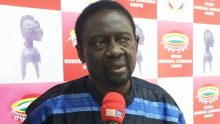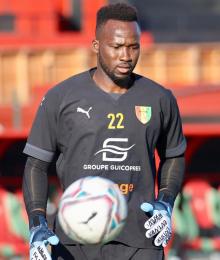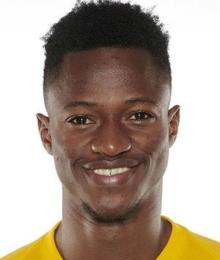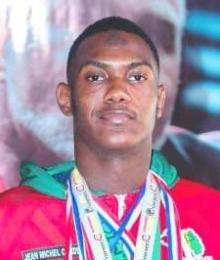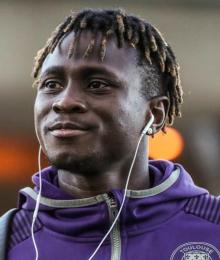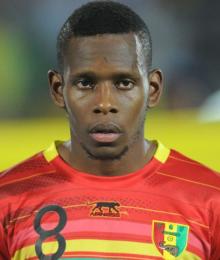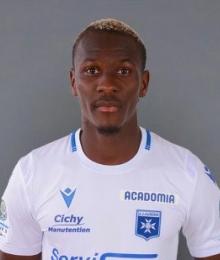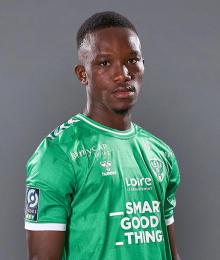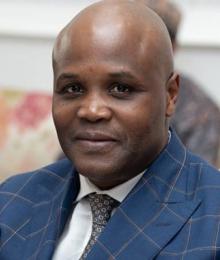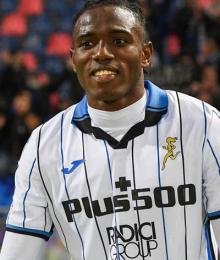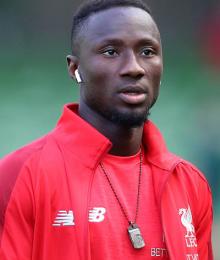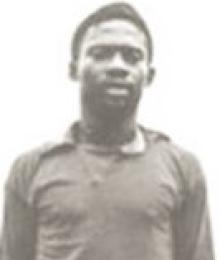
Ibrahima Sory Keita, better known as Petit Sory, is a legend of Guinean and African football. Born in 1945 in Conakry, this iconic player shone on the pitch during the 1960s and 1970s, becoming one of the best right wingers of his generation. Despite his small stature (5'6"), Petit Sory established himself as a formidable player, renowned for his speed, exceptional dribbling technique, and vision of the game.
Petit Sory's career, primarily with Hafia FC of Conakry and the Guinean national team, is studded with successes, notably three victories in the African Champions Clubs' Cup and a final appearance in the 1976 African Cup of Nations. Elected the world's best right winger at the 1972 Brazil Independence Cup, Petit Sory left an indelible mark on African football history through his exceptional performances and impressive list of achievements, making him one of the most prominent figures in sports on the continent.
Introduction
Ibrahima Sory Keita, better known as Petit Sory, is a true legend of Guinean and African football. Born in 1945 in Conakry, this iconic player left an indelible mark on the history of football in his country and across the entire continent. Nicknamed "Petit Sory" to distinguish him from his older brother, also named Ibrahima Sory, this exceptional footballer shone on the pitch in the 1960s and 1970s, becoming one of the best right wingers of his generation.
Despite his small stature (5'6"), Petit Sory established himself as a formidable player, renowned for his speed, exceptional dribbling technique, and vision of the game. His career, primarily with Hafia FC of Conakry and the Guinean national team, is studded with successes and memorable performances that contributed to writing some of the most glorious pages in African football history.
Education and Early Football Days
Born into a family of footballers, Petit Sory was immersed in the world of football from a very young age. Like many children of his era, he started by kicking oranges before discovering real footballs. His natural talent and passion for football quickly manifested, pushing him to follow in the footsteps of his older brother.
Although details about his formal education are scarce, it's evident that young Ibrahima Sory devoted a large part of his childhood and adolescence to perfecting his football skills. The streets of Conakry and makeshift pitches were his first football schools, where he developed the dribbling technique that would make him famous.
Football Career
Promising Beginnings
Petit Sory's professional career truly began in 1965 when he joined Hafia FC of Conakry, one of Guinea's most prestigious clubs. His exceptional talent quickly caught attention, and he soon established himself as a key player for the team.
The Rise with Hafia FC
With Hafia FC, Petit Sory experienced a golden period, contributing significantly to the club's numerous successes. His unique playing style, blending vivacity, tactical intelligence, and impressive dribbling technique, quickly made him one of the most feared players in the Guinean championship.
Between 1966 and 1979, Petit Sory helped Hafia FC win no less than 12 Guinean championship titles (1966, 1967, 1968, 1971, 1972, 1973, 1974, 1975, 1976, 1977, 1978, and 1979). This undisputed dominance over national football testifies to the extraordinary generation of players of which Petit Sory was a part.
Continental Successes
But it was on the continental stage that Petit Sory and Hafia FC truly made their mark on African football history. The club won the prestigious African Champions Cup (the predecessor of the current CAF Champions League) three times in 1972, 1975, and 1977. These victories made Hafia FC one of the most titled clubs in Africa at the time and propelled Petit Sory to continental stardom.
In addition to these three titles, Hafia FC, with Petit Sory as its spearhead, also reached the final of this competition in 1976 and 1978, demonstrating remarkable consistency at the highest African level.
Exploits with the National Team
Alongside his club career, Petit Sory also shone in the colors of the Guinean national team, nicknamed the Syli National. He participated in the 1968 Olympic Games in Mexico City, a first for Guinea in this competition. Although the team was eliminated in the first round, this international experience was crucial for the young player's development.
In 1970, he took part in the African Cup of Nations (AFCON), where he scored a goal against the Democratic Republic of Congo. Despite Guinea's early elimination, Petit Sory confirmed his status as a key player for the national team.
The highlight of his international career came during the 1976 AFCON in Ethiopia. Petit Sory guided Guinea to the tournament final, notably scoring a crucial goal against Ethiopia. Although the team lost to Morocco in the final, this performance remains one of the finest in Guinean football history.
The "Detention" Episode at Camp Alpha Yaya
A particular episode in Petit Sory's career deserves mention, as it illustrates the sometimes difficult context in which African footballers of the time evolved. In 1967, after a 2-2 draw against Liberia, the Guinean president Sékou Touré, unhappy with the result, allegedly "detained" the national team, including Petit Sory, in the Alpha Yaya military camp in Conakry. The goal was to force the players to intensively prepare for the return match. This unorthodox method seems to have borne fruit, as Guinea won the return match with a crushing score of 9-0, with Petit Sory scoring a hat-trick.
International Recognition
Petit Sory's talent extended beyond African borders. In 1972, he was selected to be part of the African team during the Brazil Independence Cup, a tournament bringing together selections from different continents. During this competition, he was named the best right winger in the world, an exceptional recognition for an African player at that time.
Achievements
Petit Sory's list of achievements is one of the most impressive in African football of the 1970s:
- Finalist of the African Cup of Nations in 1976 (Guinea)
- Winner of the African Champions Cup in 1972, 1975, and 1977 (Hafia FC)
- Finalist of the African Champions Cup in 1976 and 1978 (Hafia FC)
- Guinean Champion in 1966, 1967, 1968, 1971, 1972, 1973, 1974, 1975, 1976, 1977, 1978, and 1979 (Hafia FC)
Personal Distinctions
Beyond collective trophies, Petit Sory also received several individual distinctions that testify to his excellence:
- African Bronze Ball in 1972
- Named in the tournament's best XI at the 1976 African Cup of Nations
- Elected best right winger in the world during the 1972 Brazil Independence Cup
Playing Style and Characteristics
Petit Sory was an exceptional player, recognized for several qualities that made him a formidable attacker:
- Speed: Despite his small stature, Petit Sory was endowed with exceptional speed that allowed him to outpace opposing defenders.
- Dribbling: His dribbling technique was one of his trademarks. Agile and unpredictable, he was capable of creating spaces in the tightest defenses.
- Vision of the game: Beyond his individual qualities, Petit Sory was recognized for his ability to read the game and create opportunities for his teammates. As he himself stated: "I was happier if I gave scoring opportunities to a partner than when I scored the goal myself".
- Versatility: Although primarily playing as a right winger, Petit Sory was capable of playing in different offensive positions, making him a precious asset for his coaches.
- Winning mentality: His career and numerous successes testify to a champion's mindset, always ready to take on the most difficult challenges.
Tributes
Petit Sory's exceptional career has earned him numerous tributes, both from his peers and from football institutions:
- Petit Sory Stadium in Nongo: In 2021, a stadium located in Nongo, Guinea, was named in his honor, testifying to the lasting impact he has had on Guinean football.
- Recognition from his peers: Many players and coaches of his generation have praised Petit Sory's exceptional talent. His duel with Ivorian star Laurent Pokou during a match between Hafia FC and ASEC Mimosas remains in memory as one of the highlights of African football in the 1970s.
- Tribute from Pelé: During a match against a team including the legendary Pelé, Petit Sory scored a goal that made the "King" smile. This episode, recounted by Petit Sory himself, illustrates the mutual respect between these great players.
- Institutional recognition: In 2023, upon Pelé's death, Petit Sory was part of the Guinean delegation that went to the Brazilian embassy to present the country's condolences, underlining his status as an ambassador of Guinean football.
Private Life
Although Petit Sory was a public figure during his career, little information is available about his private life. Like many players of his generation, he had to balance his sporting career with the socio-economic realities of his time.
After his sporting retirement, Petit Sory remained involved in the world of football, taking on various responsibilities:
- Management of the September 28 Stadium: He held the position of Financial Director of the September 28 Stadium in Conakry, the country's largest stadium.
- Associative engagement: Petit Sory became president of the Association of Former Hafia Footballers, an NGO aimed at helping former players in difficulty.
- Social action: In 1996, Petit Sory and other former players obtained from former Guinean president Lansana Conté the integration of more than three hundred former footballers into the civil service, thus ensuring some financial security for these retired athletes.
Conclusion
Ibrahima Sory Keita, known as Petit Sory, will forever be etched in the history of Guinean and African football. His exceptional journey, both with Hafia FC and with the Guinean national team, testifies to an extraordinary talent that managed to express itself despite the difficulties of his time.
Small in stature but big in talent, Petit Sory embodies a golden generation of Guinean football that was able to fly the country's colors high on the continental and international stage. His exploits, titles, and distinctions make him one of the greatest African players of all time.
Beyond his prowess on the field, Petit Sory's commitment to the development of Guinean football and the well-being of former players testifies to a man aware of his legacy and eager to pass it on to future generations.
Today, as African football continues to develop and shine on the world stage, it is important to remember pioneers like Petit Sory, who paved the way and showed that African talent could rival the best players in the world. His story inspires and will continue to inspire young Guinean and African footballers, reminding them that with talent, hard work, and perseverance, it is possible to realize one's dreams and make football history.













